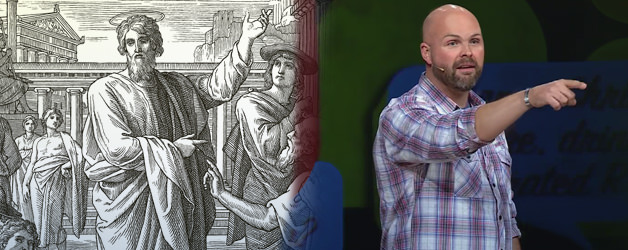
The Athens of yesterday is the America of today. The methods must always change. The message must remain the same.
By Clayton King
As a pastor and evangelist, I am often asked about preaching in the 21st century.
The questions usually take one of the following forms:
- Does preaching need to sound different to reach a more secular culture?
- How do pastors connect to non-believers from the pulpit?
- What are some ways to invite people to respond to the gospel during a sermon?
These are not only good questions; they are essential to the future of the church and the eternal destinies of those who have never heard the gospel. To answer these questions, we need to think like missionaries.
Most of us would agree that a vital part of international missions is preparing those who go to engage those to whom they are sent. Missionaries have to learn as much as they can about the language, the culture, the history and the context of the people they are attempting to reach with the gospel. I encourage preachers in the United States to do the same.
If it’s necessary to understand an unreached culture in another country, it’s just as important to understand the unreached culture in our own nation, our own city and our own community.
Despite what many may think, biblical Christianity is no longer the default civic religion in the United States. Millions of Americans are unreached with the gospel.
The good old days, when we assumed that many of our neighbors were Christians—or at least sympathetic to the gospel—have changed. Our church buildings sit on top of the ruins of post-Christendom.
As the culture changes, there’s a greater need for Christians who “understand the times” and do all they can to reach those who are far from God with the gospel.
Pastors, just as every believer, are on mission to do all we can to proclaim the gospel and make disciples.
Like missionaries who learn to “speak the language and understand the culture” of an unreached people group, ministers have the great joy (and heavy responsibility) of communicating the old story in new ways.
We must engage those who are ignorant or skeptical of Christianity in creative and winsome ways, while holding fast to the “message that we received, passed down from the apostles.”
This is no new challenge, so don’t be afraid.
Go back to the beginning
The Apostle Paul is a perfect example of a preacher who understood the need to communicate the gospel in its own context while engaging the unreached audience in their own context.
In Acts 17, Paul is in Athens, one of the most influential cities on earth, a center of philosophy, education and intelligence, home to the intellectual descendants of Socrates, Plato and Aristotle.
His goal was to proclaim the crucified and resurrected Christ to people who had no exposure to the gospel. This should be our goal as well.
Paul knew the Athenians had a different belief system and worldview from his, but he was smart enough to contextualize his delivery of the gospel to them, if and when the opportunity came.
Do we have a mentality to reach those who are far from God? As preachers of the gospel, we must constantly be thinking about the outsider we hope to reach.
We also must model that mentality to our church members. We must be willing to do whatever it takes, short of sin, to meet the outsider (the unchurched, the lost, the critic, the atheist, the confused) with the gospel.
Like Paul was willing to set aside his Jewish background to reach the Greeks, we must set aside our “traditions and preferences” to speak to an audience that doesn’t understand our language, beliefs and traditions.
You have to discern what to do to reach a new generation. When you really care about lost people being saved, you’ll work hard to create environments and messages where obstacles are removed and they are given a chance to respond. That’s a mindset that prioritizes people over preferences.
For Paul, that meant preaching at the Areopagus, a gathering place for Athens’ most revered and influential men, to present his “new teaching” to their assembly.
His proclamation of the gospel to an unreached culture is textbook. Paul began by using a traditional greeting of “Men of Athens” to his audience. He then described how he’d walked through their city, observing their architecture and religious idols.
Paul referred to the Athenians’ familiar poets and even quoted them in his public presentation of the gospel.
To find common ground and connect with his audience, he says in verse 28, “For in him we live and move and exist, as even some of your own poets have said, ‘For we are also His offspring.’” By doing so, he put a once skeptical audience at ease.
Remember this example every time you preach, as if you are addressing Athens for the first time.
For you, this may mean:
- Using current illustrations from pop culture, sports or politics, or quoting from a scene in a movie or a lyric in a song everyone knows.
- Adjusting your sermons from six points to just two.
- Listening to sermons from other pastors and learning from their creativity and delivery.
- Including video in your sermons, adding salvation testimonies to Sunday morning services, or bringing props on stage as object lessons to make your point unforgettable.
During a series called “Redneck,” I rode out on stage on a 4-wheeler and preached a sermon on John the Baptist. More than 400 people responded to the gospel that day, and we baptized almost all of them within a month.
The 4-wheeler didn’t save them, but it helped people understand who John the Baptist was in modern terms. It also communicated that we were willing to use different methods to reach those who had never heard.
Be creative but don’t compromise
Once he connected with his audience, Paul moved to the person of Jesus, the testimony of the resurrection, a warning about coming judgment and a command to repent of sin. He didn’t compromise the message by contextualizing his delivery and neither should you.
He spoke their language, literally and figuratively. He won a hearing by treating them with honor and respect. He dignified them as humans, spoke to them in their context, and seized the small window of opportunity to preach the gospel. And guess what happened?
Some sneered. Some were curious and wanted more time to think about it. And some believed and were converted, namely Dionysius and Damaris.
He evidently extended an invitation for them to believe, and so should you:
- Don’t be afraid that outsiders won’t respond, because it’s the gospel that draws them, not our invitation.
- Be clear. Be bold. Don’t manipulate.
- Ask people to respond and tell them how to be saved.
- Trust the Scripture and the Holy Spirit and invite them to believe.
The Athens of yesterday is the America of today. The methods must always change. The message must remain the same.
Are we mindful of the outsiders who hear us preach? Do we even want them in our church? And if so, are we willing to do whatever it takes to reach them?

Clayton King
Clayton is an evangelist, pastor, and author of 18 books, including True Love Project, Grounded, and Reborn. He’s a minister in residence at Anderson University and Founder of Crossroads Camps and Conferences. He lives with his wife Sharie in Anderson, S.C., and has two sons, Jacob and Joseph.











